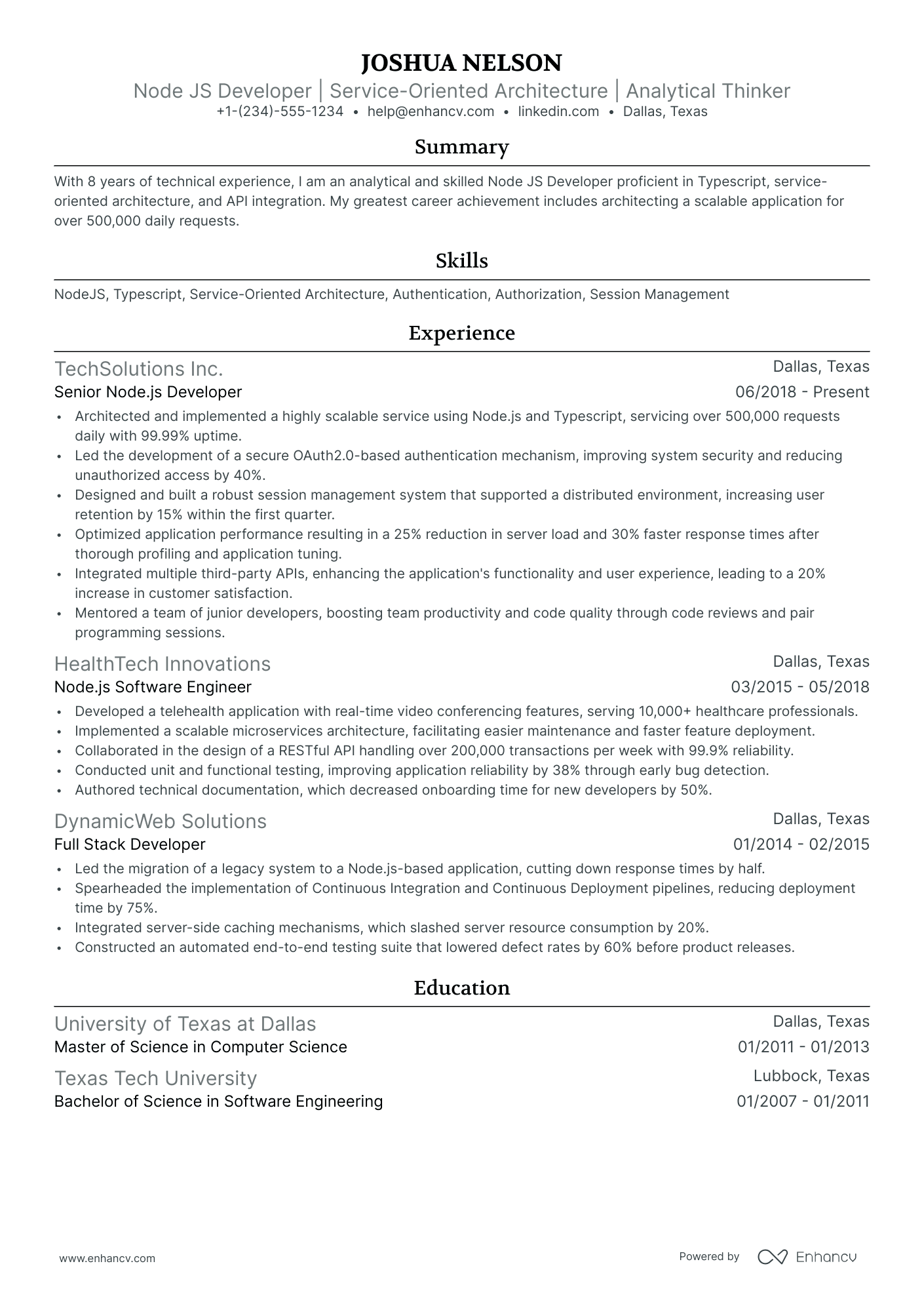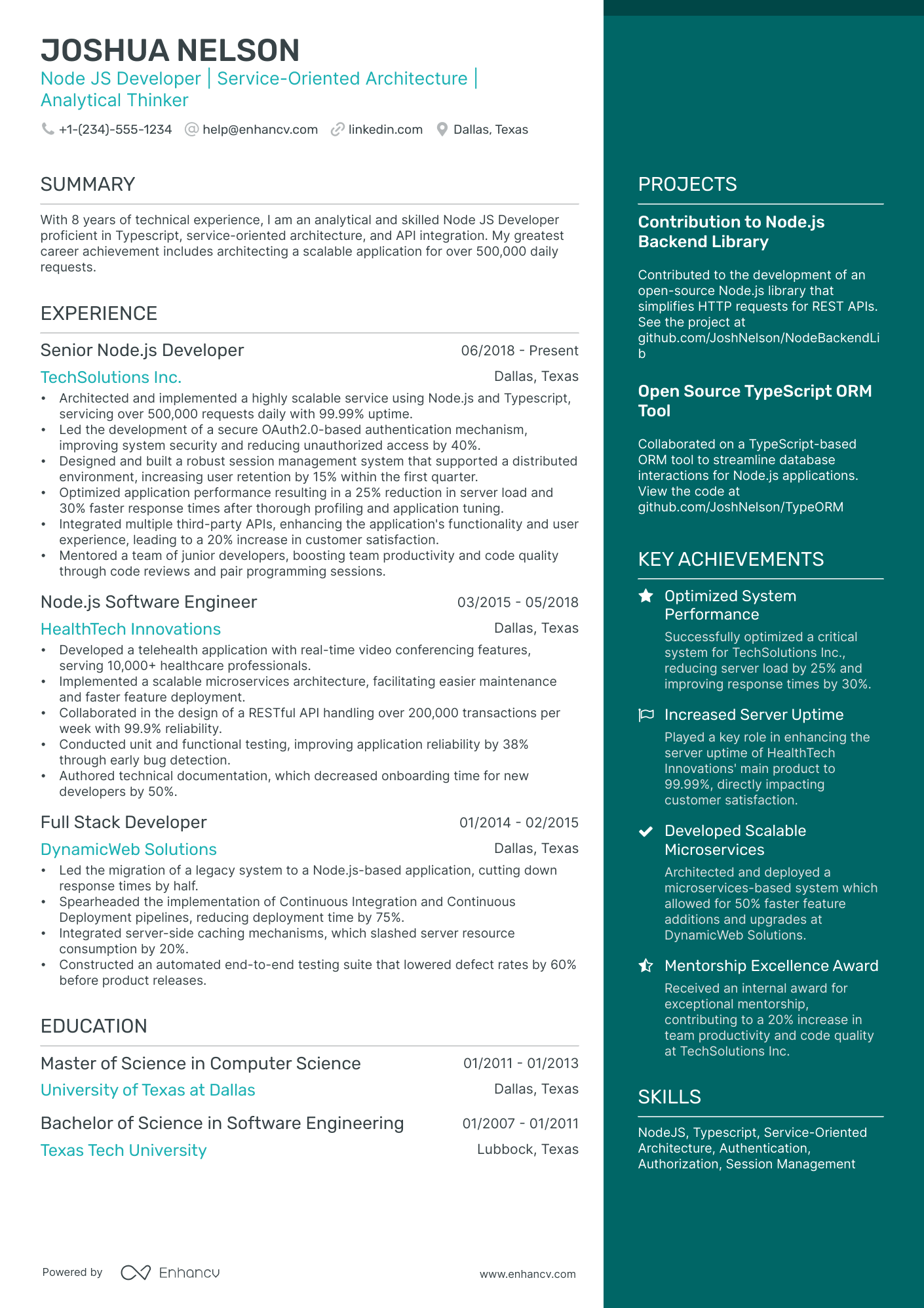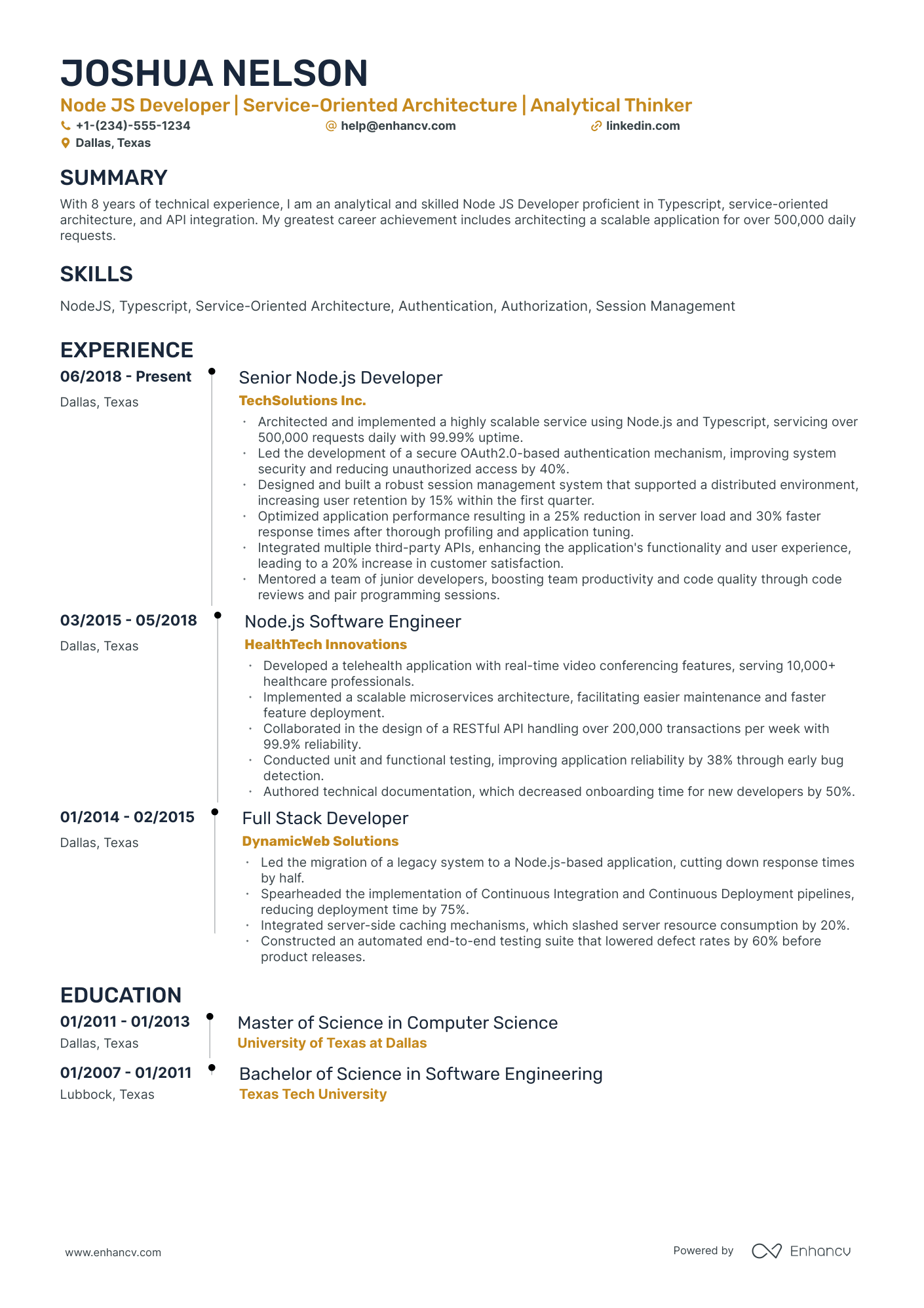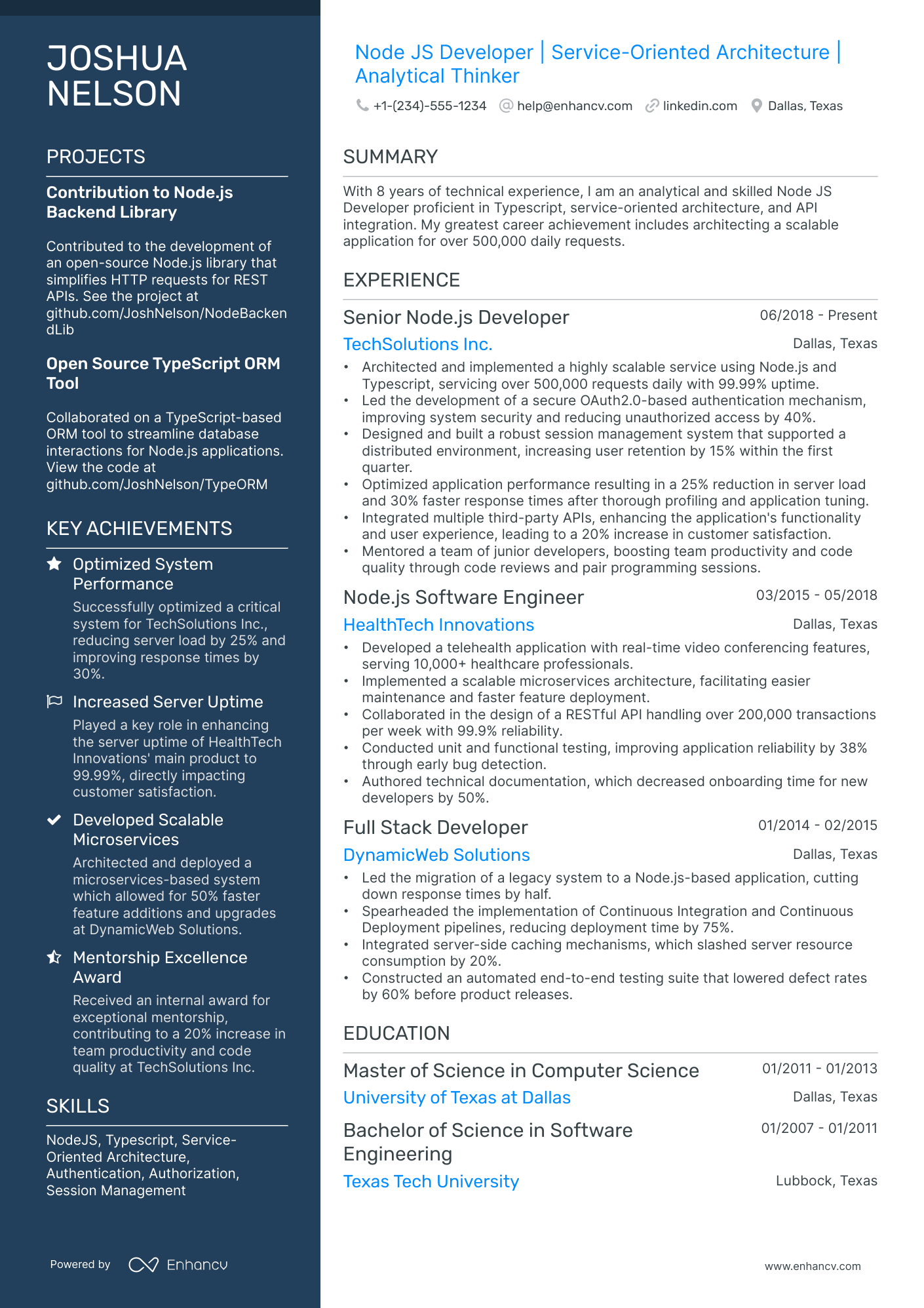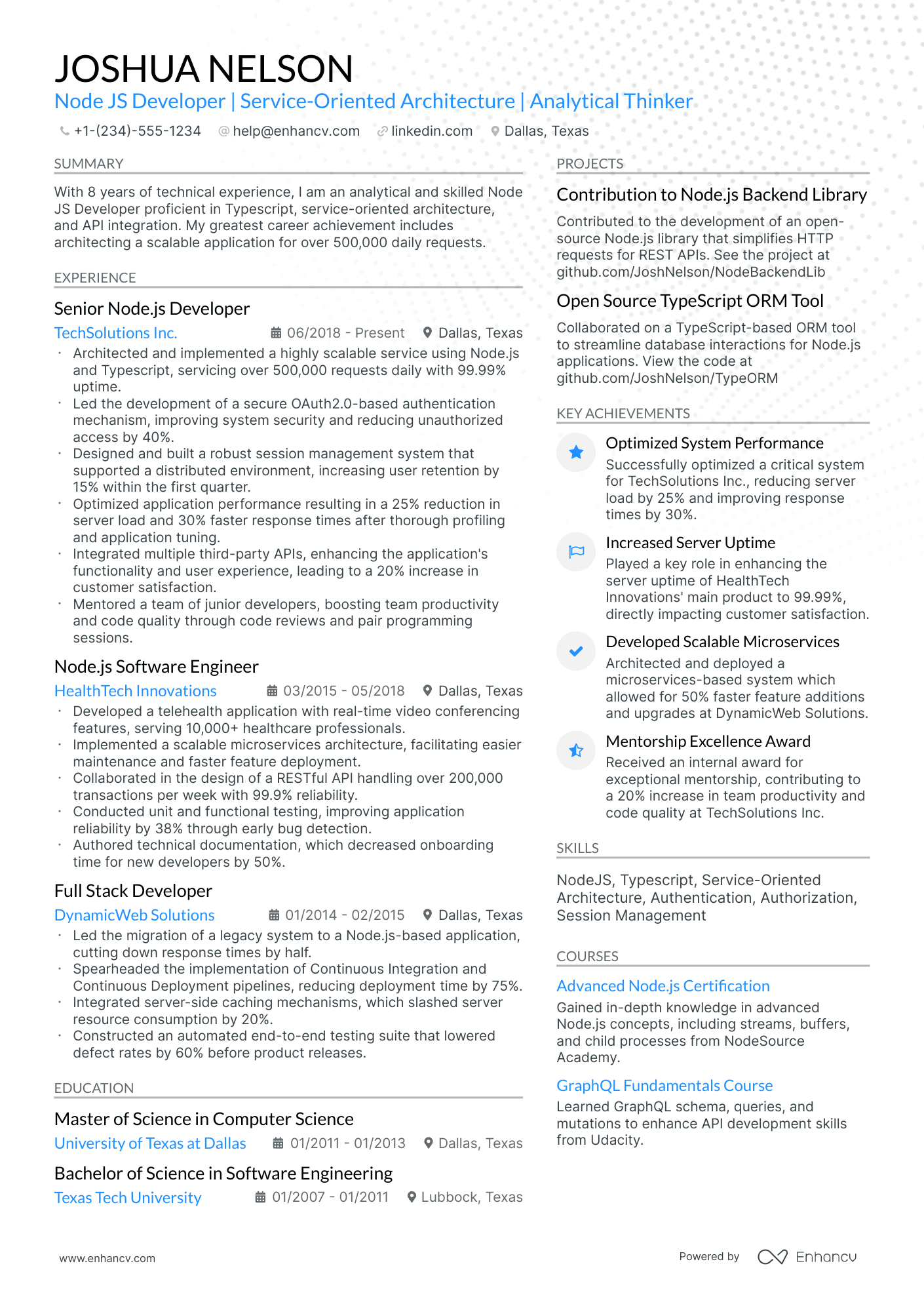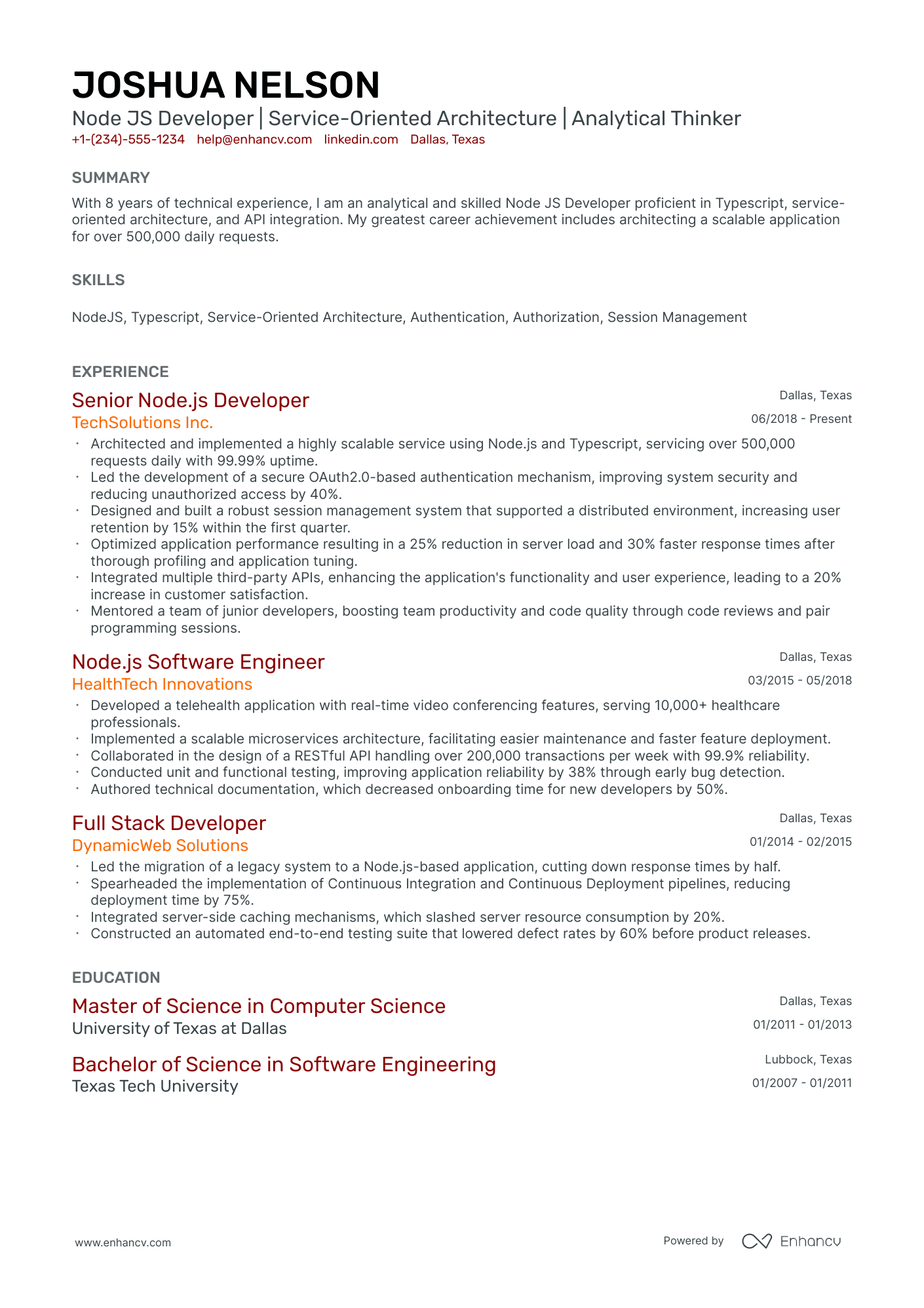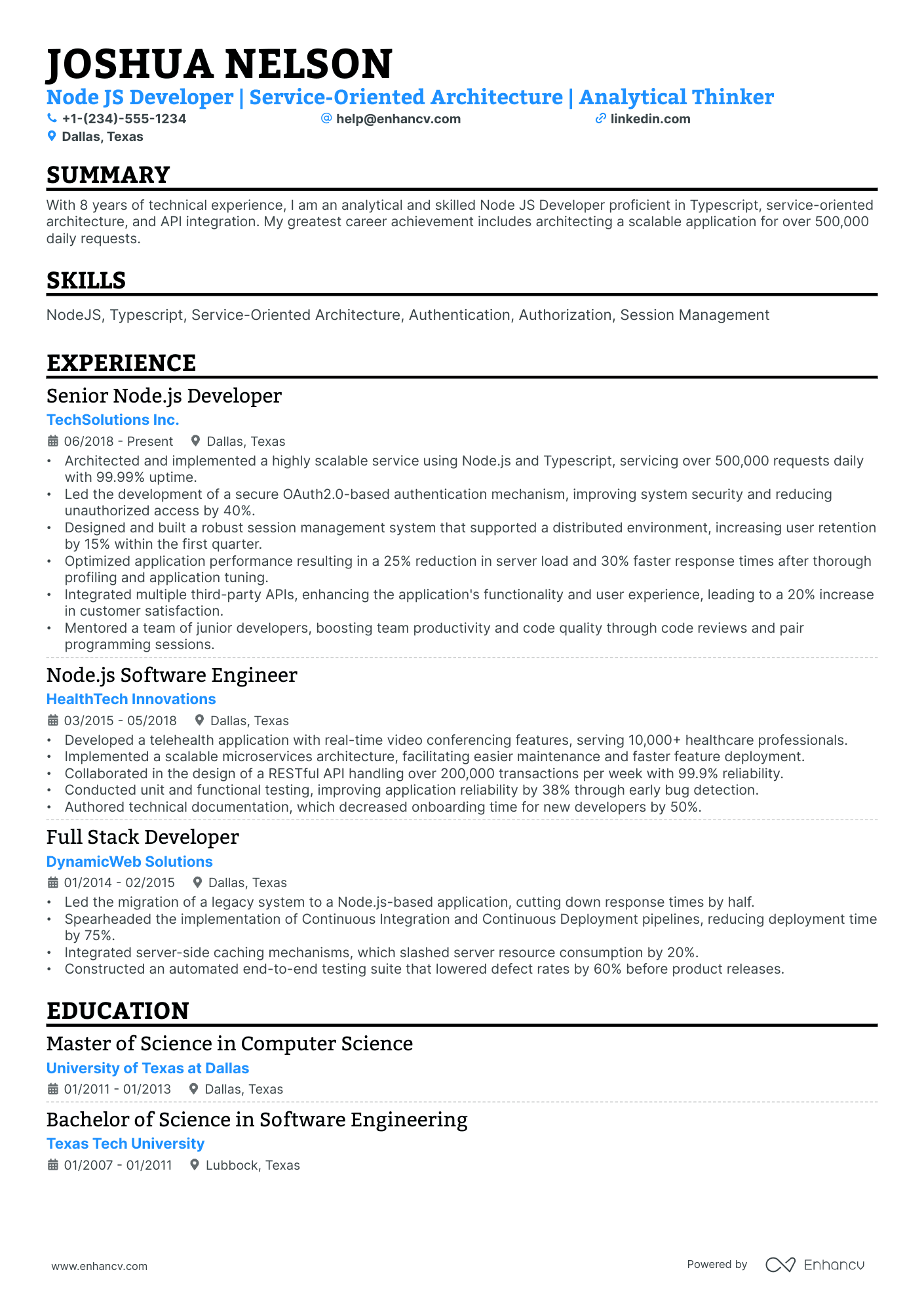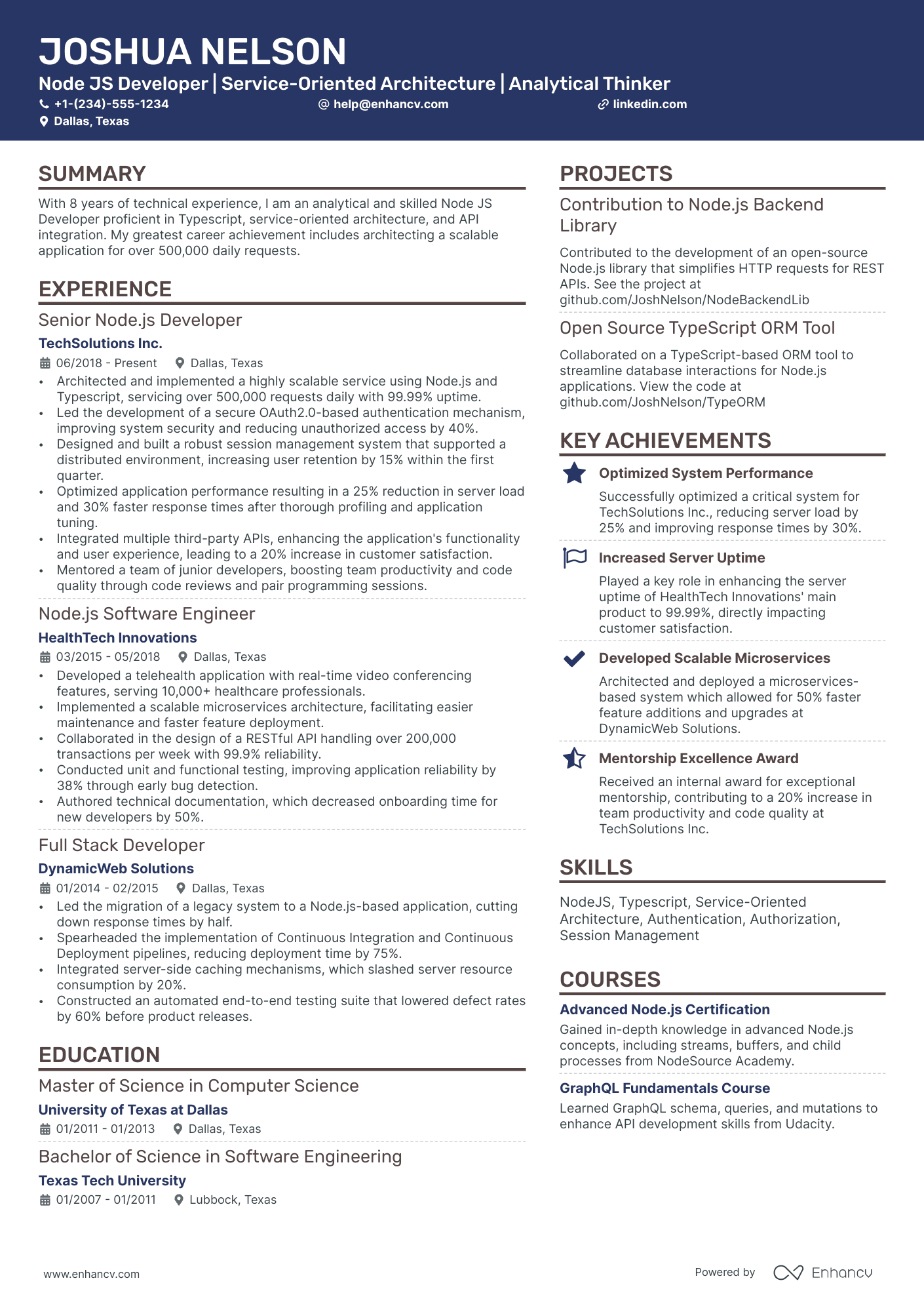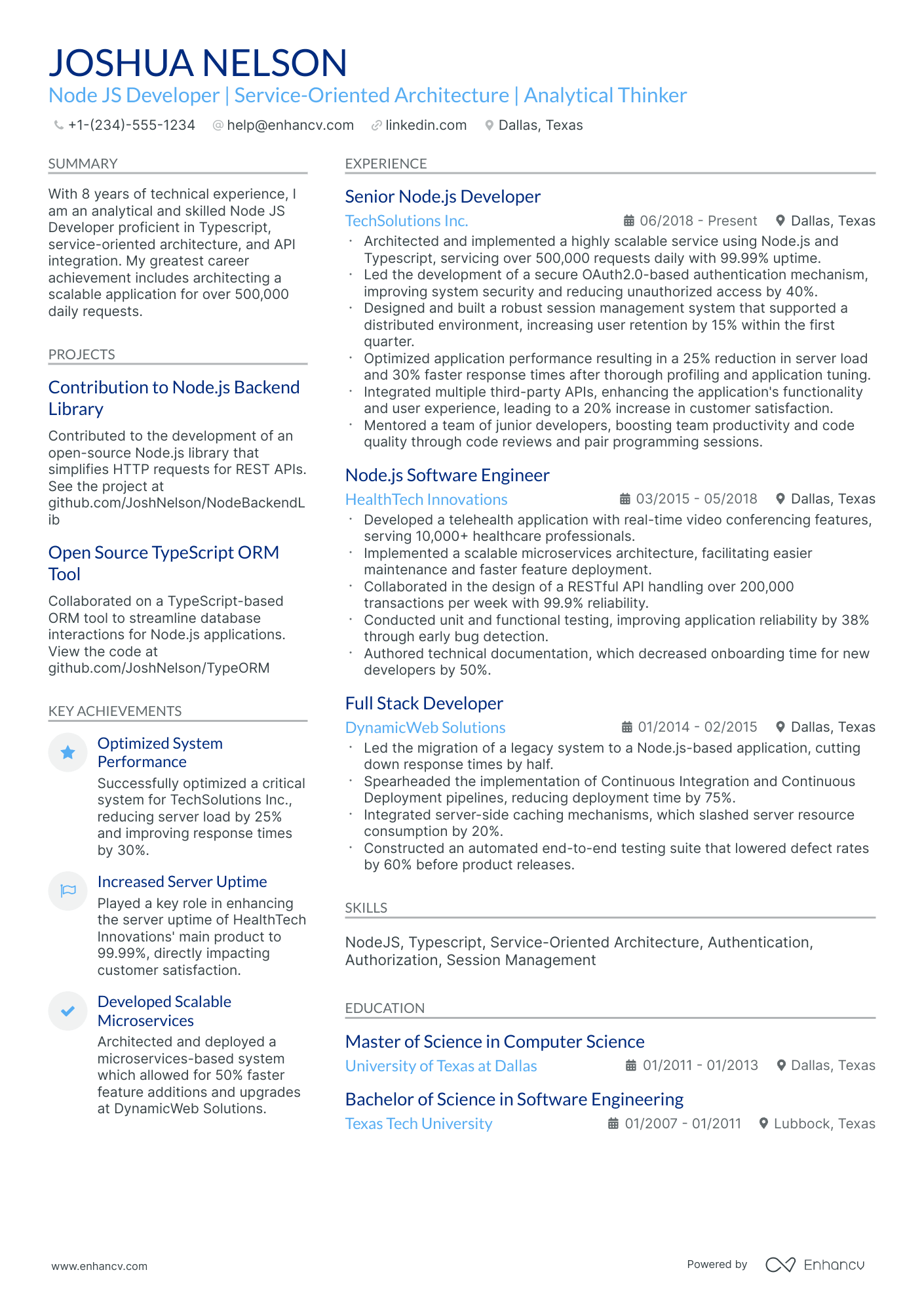As a Node.js developer, articulating your expertise in managing asynchronous operations and complex data flows in your resume can be a daunting challenge. Our guide provides clear strategies and examples to showcase your skills in Node.js, ensuring your abilities are communicated effectively to potential employers.
- Get inspired from our Node.js developer resume samples with industry-leading skills, certifications, and more.
- Show how you can impact the organization with your resume summary and experience.
- Introducing your unique Node.js developer expertise with a focus on tangible results and achievements.
If the Node.js developer resume isn't the right one for you, take a look at other related guides we have:
- IT Service Delivery Manager Resume Example
- Voip Network Engineer Resume Example
- QA Analyst Resume Example
- Computer Engineer Resume Example
- Application Support Manager Resume Example
- Help Desk Manager Resume Example
- Python Full Stack Developer Resume Example
- QA Automation Resume Example
- Developer Resume Example
- Assistant IT Manager Resume Example
Formatting the layout of your Node.js developer resume: design, length, and more
When it comes to the format of your Node.js developer resume , you've plenty of opportunities to get creative. But, as a general rule of thumb, there are four simple steps you could integrate into your resume layout.
- If you have plenty of experience, you'd like to showcase, invest in the reverse-chronological resume format . This format focuses on your latest experience items and skills you've learned during your relevant (and recent) jobs.
- Don't go over the two-page limit, when creating your professional Node.js developer resume. Curate within it mainly experience and skills that are relevant to the job.
- Make sure your Node.js developer resume header includes all of your valid contact information. You could also opt to display your professional portfolio or LinkedIn profile.
- Submit or send out your Node.js developer resume as a PDF, so you won't lose its layout and design.
Adjust your resume layout based on the market – Canadian resumes, for example, may follow a unique format.
Upload & Check Your Resume
Drop your resume here or choose a file. PDF & DOCX only. Max 2MB file size.
PRO TIP
If you happen to have some basic certificates, don't invest too much of your Node.js developer resume real estate in them. Instead, list them within the skills section or as part of your relevant experience. This way you'd ensure you meet all job requirements while dedicating your certificates to only the most in-demand certification across the industry.
Fundamental sections for your Node.js developer resume:
- The header with your name (if your degree or certification is impressive, you can add the title as a follow up to your name), contact details, portfolio link, and headline
- The summary or objective aligning your career and resume achievements with the role
- The experience section to curate neatly organized bullets with your tangible at-work-success
- Skills listed through various sections of your resume and within an exclusive sidebar
- The education and certifications for more credibility and industry-wide expertise
What recruiters want to see on your resume:
- Proficiency with Node.js and its frameworks like Express.js, Koa, or Hapi.
- Experience with asynchronous programming using callbacks, promises, and async/await syntax.
- Familiarity with RESTful API design and development, and knowledge of GraphQL is a plus.
- Understanding of Node.js security best practices, such as securing HTTP headers and preventing SQL injection.
- Proficiency in using Node.js-compatible databases (both SQL and NoSQL) and experience with ORMs/ODMs like Sequelize and Mongoose.
Creating your Node.js developer resume experience to catch recruiters' attention
Remember that for the Node.js developer role, hiring managers are looking to see how your expertise aligns with their requirements. Here's where your resume experience section can help out. Make sure you:
- Include mainly roles that are relevant to the Node.js developer job you're applying for;
- Don't go too far back in your experience - recruiters will only care what you did a decade ago if it's really important for the Node.js developer role;
- Each bullet you include should say what you did, followed by the skills you used and the actual end result of your efforts;
- Quantify each of your achievements with numbers and possibly the overall effect it had on the organization;
- Highlight transferrable skills - or personal skills you've attained thanks to past jobs - that could be applicable within your potential workplace. This would showcase your unique value as a professional.
Formatting the experience section of your resume doesn't have to be an over-the-top deep dive into your whole career. Follow the Node.js developer resume examples below to see how industry-leading professionals are presenting their experience:
- Led the development of a real-time analytics platform using Node.js, which processed over 1 million data points per day, enhancing data-driven decision-making for clients.
- Optimized application performance by implementing efficient code practices and reducing server response time by 35%, significantly improving user experience.
- Developed and maintained robust RESTful APIs, effectively handling more than 10,000 requests per hour, ensuring seamless communication between front-end and back-end systems.
- Collaborated with cross-functional teams to integrate Node.js services with microservices architecture, resulting in a 20% increase in service scalability.
- Automated deployment processes using Docker, decreasing deployment time by 40% and enabling continuous integration and continuous delivery workflows.
- Pioneered the implementation of WebSocket for implementing a chat feature, which improved real-time communication for over 5,000 active users.
- Designed and executed a comprehensive Node.js application security plan, resulting in a 50% reduction in potential security threats.
- Revamped legacy systems using Node.js, enhancing system efficiency by reusing existing components and reducing costs by 30%.
- Directed a team of developers in creating a multi-tenant SAAS platform that now serves over 100 businesses, applying agile methodologies for on-time delivery.
- Engineered a high-throughput Node.js event-logging service for a popular gaming platform, efficiently handling over 600 events per second.
- Spearheaded the transition from monolithic to microservices architecture, enhancing system modularity and ease of maintenance.
- Authored technical documentation and API guides which facilitated a 40% increase in developer onboarding efficiency and reduced initial training requirements.
- Integrated machine learning models into a Node.js-based predictive analysis tool, improving forecast accuracy by 25% for retail inventory management.
- Mentored junior developers in Node.js best practices, which raised team productivity by 15% and reduced the code review cycle time.
- Implemented GraphQL to existing RESTful services, which increased data retrieval flexibility for front-end developers and reduced over-fetching data issues.
- Orchestrated the migration of a legacy e-commerce platform to a Node.js-based system, improving server response times and handling 3x more user transactions.
- Engineered a Node.js application monitoring strategy using Prometheus and Grafana, which proactively addressed system bottlenecks and improved uptime to 99.99%.
- Cultivated an API-first approach in product development, leading to a more modular structure and facilitating partnerships with third-party vendors.
- Developed a distributed Node.js messaging system capable of processing and routing over 200,000 messages per day, bolstering internal communications.
- Championed the use of Elasticsearch with Node.js for creating an advanced search system, increasing search performance and accuracy.
- Executed complete restructuring of the database layer within Node.js applications, utilizing NoSQL databases for better scalability and flexibility.
- Piloted a Node.js internationalization project that allowed the platform to support multiple languages, broadening the user base by over 30%.
- Established a continuous code integration pipeline using Node.js and Jenkins, reducing bugs by 20% and streamlining the development process.
- Developed a custom content management system with Node.js, which supported dynamic content updates and handled 10,000 daily active users.
- Lead the charge in adopting server-side rendering techniques with Node.js for an online media platform, which improved SEO scores and page load times by 50%.
- Facilitated real-time data synchronization across distributed systems with Node.js, enhancing the reliability of business-critical operations.
Quantifying impact on your resume
- Include the total number of Node.js applications you've developed to showcase your experience.
- List the percentage increase in performance metrics due to optimizations you implemented in the applications.
- State the number of code commits you've pushed to reflect your continuous integration involvement.
- Mention the decrease in server costs achieved through efficient code or architecture you designed.
- Quantify the number of real-time applications you have worked on to emphasize your expertise in the domain.
- Detail how many modules or packages you have published to npm, indicating your contribution to the community.
- Describe the amount of reduced latency in network communications as a result of your coding practices.
- Record the number of third-party integrations you have successfully implemented to show your adaptability.
Action verbs for your Node.js developer resume
Remember these four tips when writing your Node.js developer resume with no experience
You've done the work - auditing the job requirements for keywords and have a pretty good idea of the skill set the ideal candidate must possess.
Yet, your professional experience amounts to a summer internship .
Even if you have limited or no professional expertise that matches the role you're applying for, you can use the resume experience section to:
- List extracurricular activities that are relevant to the job requirements. Let's say you were editor-in-chief of your college newspaper or part of the engineering society. Both activities have taught you invaluable, transferrable skills (e.g. communication or leadership) that can be crucial for the job;
- Substitute jobs with volunteer experience. Participating in charity projects has probably helped you develop an array of soft skills (e.g. meeting deadlines and interpersonal communications). On the other hand, volunteering shows potential employers more about you: who you are and what are the causes you care about;
- Align job applications with your projects. Even your final-year thesis work could be seen as relevant experience, if it's in the same industry as the job you're applying for. Ensure you've listed the key skills your project has taught you, alongside tangible outcomes or your project success;
- Shift the focus to your transferrable skills. We've said it before, but recruiters will assess your profile upon both job requirements and the skills you possess. Consider what your current experience - both academic and life - has taught you and how you've been able to develop your talents.
Recommended reads:
PRO TIP
Bold the names of educational institutions and certifying bodies for emphasis.
Popular Node.js developer hard skills and soft skills for your resume
Apart from assessing your professional expertise, recruiters are on the lookout for whether your skills align with the job.
Your profile would thus be assessed in regard to your:
- Hard or technical skills - your ability to perform on the job using particular technologies or software
- Soft skills - how you adapt, communicate, and thrive in different environments.
Both types of skills - hard and soft skills - are important for your resume, so make sure to create a dedicated skills section that:
- Lists up to five or six skills that align with the job advert.
- Integrates vital keywords for the industry, but also reflects on your personal strengths.
- Builds up further your skills with an achievements section within which you explain what you've achieved thanks to using the particular skill.
- Aims to always quantify in some way how you've used the skill, as it's not enough to just list it.
What are the most sought out hard and soft skills for Node.js developer roles?
Check out the industry's top choices with our two dedicated lists below:
Top skills for your Node.js developer resume:
Node.js
Express.js
JavaScript
RESTful APIs
MongoDB
SQL
Git
Docker
Jest
TypeScript
Problem-solving
Communication
Teamwork
Time management
Adaptability
Attention to detail
Critical thinking
Creativity
Collaboration
Self-motivation
PRO TIP
If you failed to obtain one of the certificates, as listed in the requirements, but decide to include it on your resume, make sure to include a note somewhere that you have the "relevant training, but are planning to re-take the exams". Support this statement with the actual date you're planning to be re-examined. Always be honest on your resume.
The Node.js developer resume sections you may underestimate: certifications and education
Your education and certifications provide insight into both your technical capabilities and personal attributes, such as perseverance. When crafting your Node.js developer resume, consider how you present these elements:
- For your higher education degrees, prioritize listing those most relevant to the job or indicative of your academic dedication;
- Include applicable coursework as a stand-in for relevant experience or if it might impress recruiters;
- Include incomplete higher education only if it's pertinent to meeting job requirements;
- If your degree is from a renowned university, mention how often you made the Dean's list to underline academic excellence.
Regarding certifications, it's not necessary to list all of them. Instead, match up to three of your most recent or significant certificates with the technical skills required in the job description.
Below, we've selected some of the top industry certifications that could be vital additions to your Node.js developer resume.
The top 5 certifications for your Node.js developer resume:
- Node.js Certified Developer (NCD) - OpenJS Foundation
- Professional JavaScript Developer Certification (PJD) - W3Schools
- JavaScript and Node.js Full Stack Developer Certification (JSNSD) - The Linux Foundation
- Microsoft Certified: Azure Developer Associate (AZ-204) - Microsoft
- Certified Web Development Professional - WebProfessionals.org
PRO TIP
Mention specific courses or projects that are pertinent to the job you're applying for.
Recommended reads:
Professional summary or objective for your Node.js developer resume
Node.js developer candidates sometimes get confused between the difference of a resume summary and a resume objective.
Which one should you be using?
Remember that the:
- Resume objective has more to do with your dreams and goals for your career. Within it, you have the opportunity to showcase to recruiters why your application is an important one and, at the same time, help them imagine what your impact on the role, team, and company would be.
- Resume summary should recount key achievements, tailored for the role, through your career. Allowing recruiters to quickly scan and understand the breadth of your Node.js developer expertise.
The resume objectives are always an excellent choice for candidates starting off their career, while the resume summary is more fitting for experienced candidates.
No matter if you chose a summary or objective, get some extra inspiration from real-world professional Node.js developer resumes:
Resume summaries for a Node.js developer job
- With over 7 years of experience as a dedicated Node.js developer at a Fortune 500 technology firm, I have a proven track record in building efficient, scalable backend systems. Well-versed in JavaScript, Express, MongoDB, and AWS, my key achievement includes reducing system load time by 40% through performance optimizations.
- Former Python developer with a strong background in data analysis transitioning to Node.js development after 3 years of experience. Skilled in Docker, RESTful API development, and Agile methodologies. Successfully executed a complete migration of a legacy system to Node.js, enhancing system responsiveness by 50%.
- After a 5-year tenure as a front-end developer for a leading e-commerce startup, I am pivoting my career towards back-end development with a focus on Node.js. My front-end expertise, combined with recent Node.js certifications, fortifies my ability to contribute to full-stack development projects effectively.
- Emerging software engineer eager to apply the comprehensive knowledge of JavaScript and Node.js acquired through academic coursework and personal projects. Commitment to mastering server-side development is demonstrated by developing a Node.js-powered chat application that served as my final university project, showcasing real-time communication capabilities.
- Seeking to embark on a career path in Node.js development, my objective is to leverage my analytical thinking and problem-solving skills honed as a Mathematics major. I am keen on applying these capabilities in writing clean, efficient code and partaking in collaborative projects that drive technological innovation.
- Driven to become a proficient Node.js developer, I aim to amalgamate my knowledge in computer science principles with hands-on experience in web development. As a recent graduate, my objective is to contribute fresh perspectives and unwavering dedication to further the ambitions of a forward-thinking development team.
Beyond your Node.js developer resume basics - extra sections
Ensure your Node.js developer resume stands out from the crowd by spicing it up with a couple of supplementary sections that showcase your:
- Prizes - as a special nod to what matters most in the field;
- Projects - ones that would really further support your application;
- Hobbies - include only if you think they'd further your chances at landing the role with personality
- Community impact - to hint at the causes you care about.
Key takeaways
- The logic of your resume presentation should follow your career highlights and alignment with the role;
- Curate information within different sections (e.g. summary, experience, etc.) that helps highlight your strengths;
- Exclude from your resume irrelevant experience items - that way you'd ensure it stays no longer than two pages and is easy to read;
- Dedicate space within the summary, experience, and/or achievements to highlight precisely why you're the best candidate for the role via your previous success;
- Both your technical and people capabilities should also play a crucial role in building up your Node.js developer application. Prove your skill set in various resume sections.
